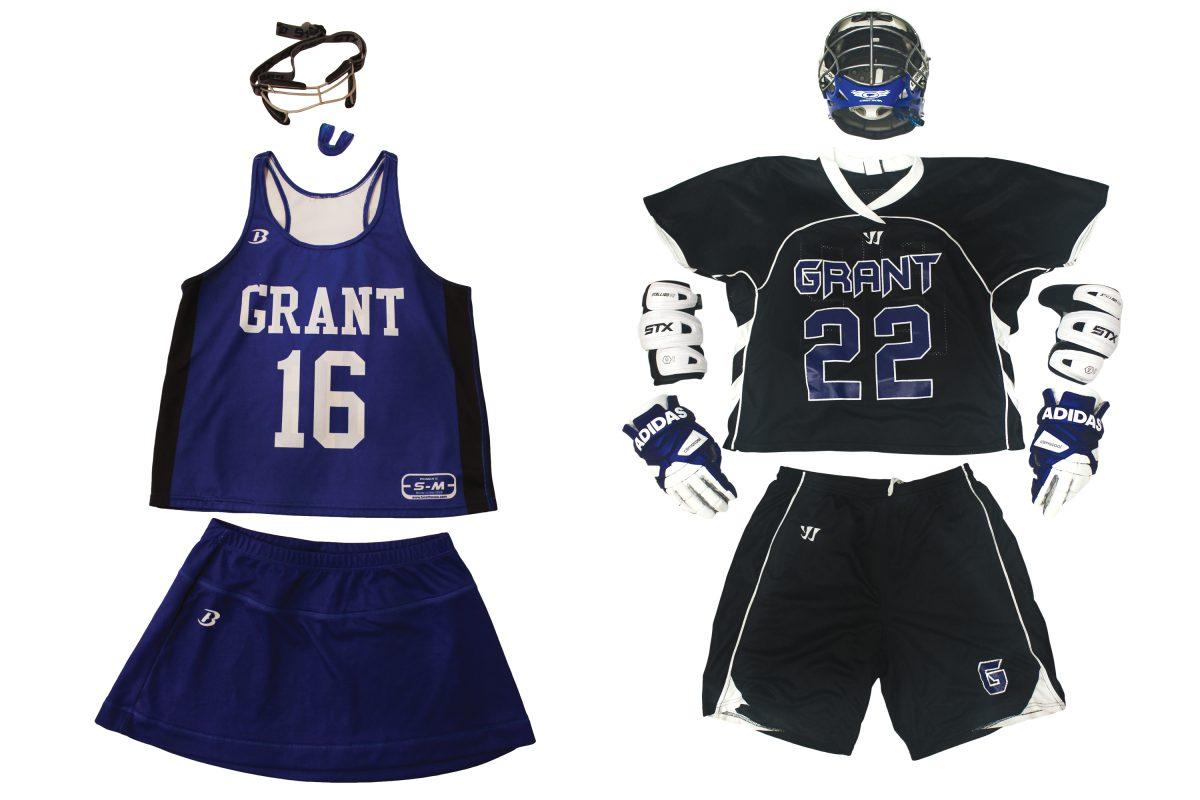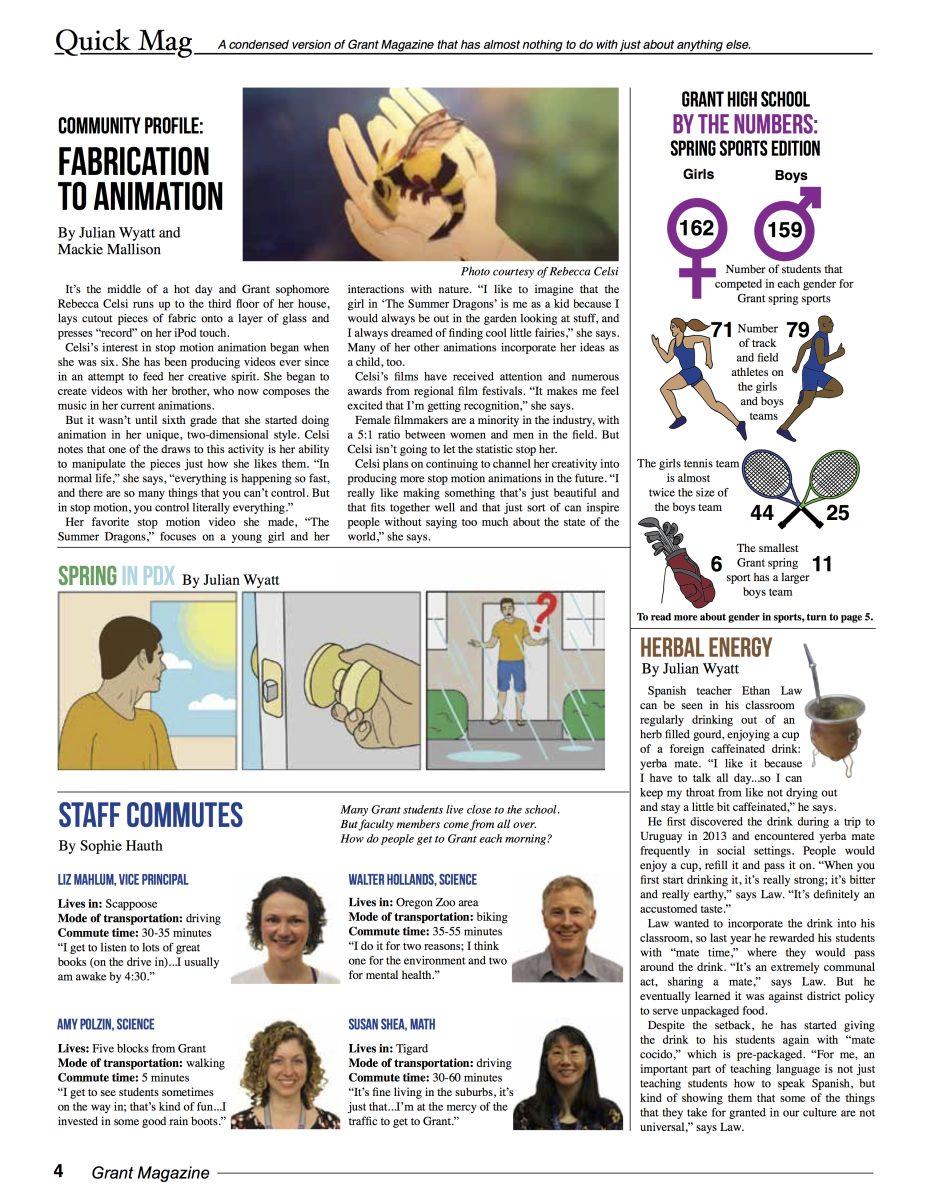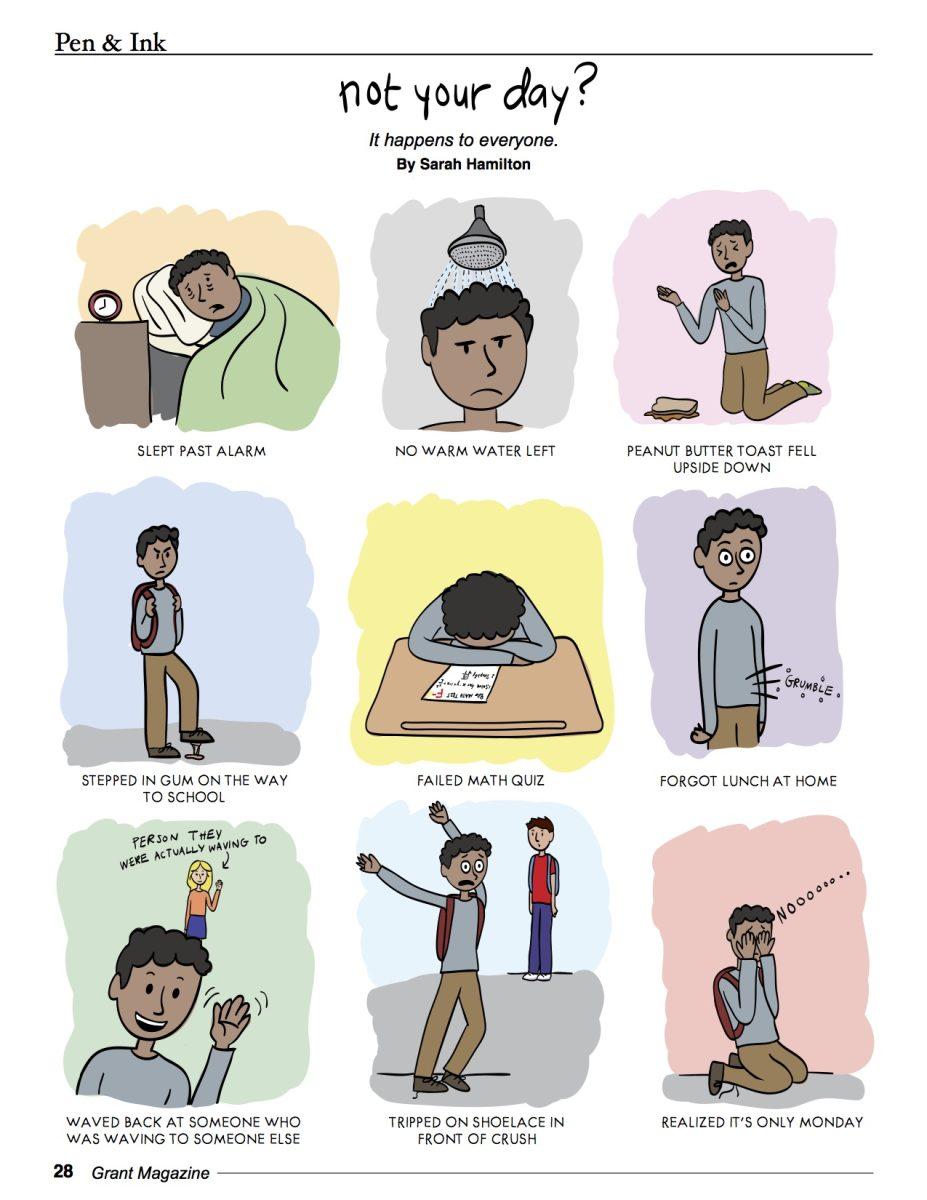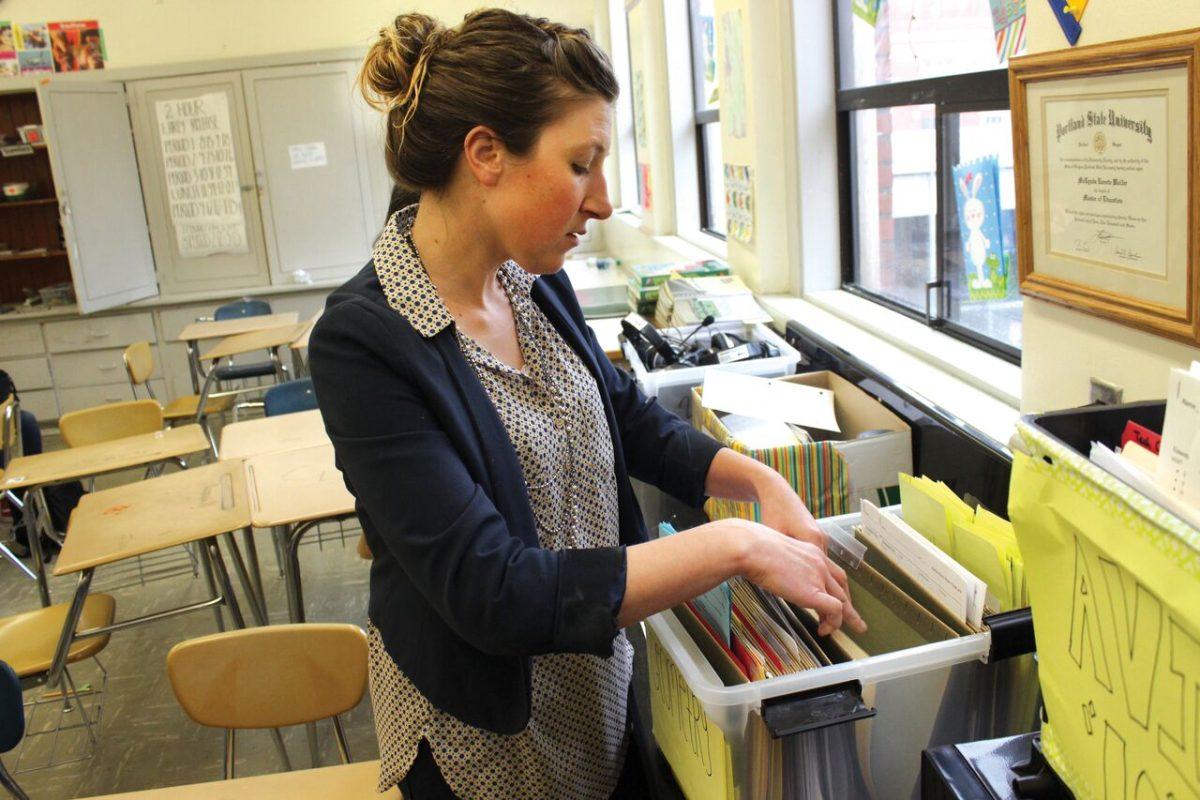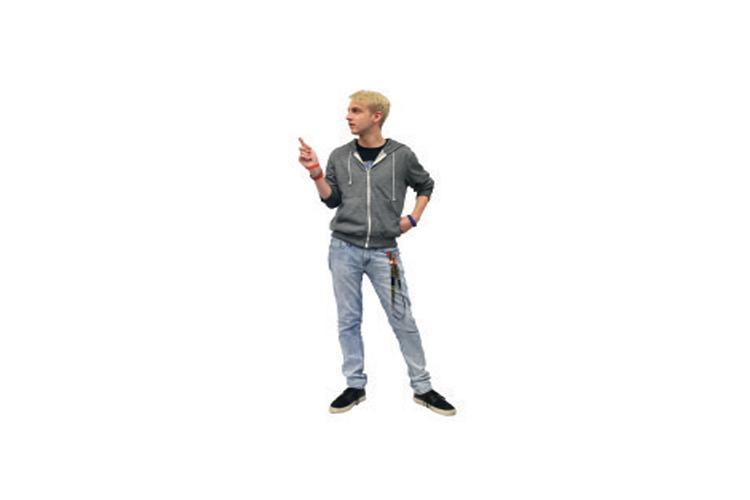Gina Boon secures the Velcro strap of her knee pads and begins to lace up her skates. A number of young women around her in athletic shorts, tank tops and tall socks braid their hair before donning helmets.
It’s 4 p.m. on a recent Friday afternoon and Boon, a Grant High School junior, is gearing up for roller derby practice at Oaks Park in Southeast Portland, where she spends most Fridays after school.
Although she has only been playing roller derby for a little more than a year, Boon says that for her, the sport has turned into more than just an athletic team.
Boon, whose father died when she was four, has spent most of her childhood trying to make up for experiences she feels she missed out on by not growing up in a traditional family.
Now, she says roller derby has become the community she’s always been searching for, and it’s given her a newfound sense of confidence.
“I’ve looked for a family… in sports because I didn’t really grow up with a normal family,” says Boon, 17. “I always look forward to going to derby, and I know…that’ll always be my one pick-me-up.”
Gina Boon was born on March 21, 1999, in North Portland to Sandra and James Boon. In 2003, her father was diagnosed with prostate cancer. A year later he died at home, leaving Boon with only a few memories from the last months of their time together.
“He would sit in the chair in our living room with the IV,” she remembers. “We had a bed that he stayed in in the house…he wasn’t doing much those last few months.”
Soon after their father’s death, the last of Boon’s three siblings moved out for college, and Sandra Boon was left to take care of her 5-year-old daughter alone. She decided to move to Florida where she and Boon would be able to grieve close to family.
Still young at the time, Gina Boon remained mostly unfazed by her father’s death. She braved Florida’s newness with ease, and Sandra Boon says her daughter’s enthusiasm for learning set her apart at an early age.
“She shocked me when we were at (a) school event, and kids were singing, and she says, ‘I want to sing,’” Sandra Boon recalls. “I was shocked, but then she got up and started singing on stage in front of everyone.”
After third grade, Boon and her mother moved back to Portland, and the youngster readjusted just as quickly as she’d left. She immersed herself in activities: a chess team, band, guitar lessons. It was also around that time that Boon first began to question her sexuality.
“When I was younger, I didn’t know that you could like people that weren’t just boys,” Boon says. “When nobody talks about it, you don’t even realize that…it exists. I was like, what’s going on? Is this normal?”
Then, in seventh grade, when Sandra Boon’s co-worker got married to her girlfriend, Boon tagged along with her mother to the wedding. During the ceremony, she remembers thinking, “Wait a minute; this seems right.”
The experience answered the questions Boon had been toying with for several years. Shortly after that day, Boon began to identify herself as pansexual – someone who can be attracted to any gender or sexual identity.
But she refrained from coming out to her family. At the time, Boon’s family seemed to be scattered all over the place. Her brother, Alex Boon, was studying abroad for several years, while her sisters lived in other states. Not ready to broach the subject with her mother, Boon dove deeper into sports, attempting to find the sense of belonging she didn’t feel at home.
When Boon came to Grant as a freshman in 2013, she was hesitant to try out for a high school team, worried that she would be judged by the other players for not being good enough. With encouragement from her mother, Boon tried playing softball – a sport her father used to coach and her older siblings had always enjoyed—but eventually decided it was not for her.
“There was a lot of pressure on like just the JV team,” she says. “I preferred something more like chill and laid back; less stress, I guess. I was just kind of tired of it.”
After quitting, Boon found herself with more time on her hands than she knew what to do with. So, when a friend invited her to an orientation meeting for a local roller derby team, Boon thought, “Why not?”
When Boon first told her mother, she was not supportive. Sandra Boon had seen roller derby in movies and TV shows and didn’t like how aggressive the sport seemed. She didn’t want to risk Boon getting injured.
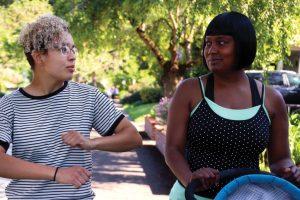
“I didn’t know anything about roller derby other than they crash into each other,” Sandra Boon recalls. “It was just too unsafe…When her dad passed away, I felt like I needed to protect her because it was just the both of us left in the house.”
But Boon was determined to try it. She persuaded her mother to let her attend a practice and quickly became hooked.
“It was pretty scary, just because I didn’t know what I was doing,” says Boon of her first day practicing with the Junior Seedlings Squad of Rose City Rollers, a local roller derby team. “But I remember seeing more experienced skaters there that were there to help us out, and they were super nice and cool and very gung-ho about encouraging others.”
To her surprise, Boon turned out to be a natural. She improved faster than many of her teammates that began playing at the same time she did.
But it wasn’t always easy. Roller derby is a technical sport. Players learn different stopping techniques, how to jump on skates, how to skate backwards and how to hit opponents safely.
Alloquios Callaway, a close friend of Boon’s who also plays roller derby, remembers how difficult practices could get. She says that Boon’s persistence pushed her to stick with the sport even when she didn’t want to.
“In roller derby we fall a lot,” says Callaway. “I was going to quit…but then I saw that (Gina) was going to keep going and persevering, so she inspired me to do that. That’s a big part of her personality.”
Now, a little over a year since she first started, Boon says that roller derby has given her the kind of community she’s always been looking for. Not only is it a safe environment where she feels willing to make mistakes, but it has helped her come to terms with her sexuality, as Boon says many of the people involved identify as non-straight.
“I think especially queer kids…play roller derby,” says Boon, “because it’s a really safe and accepting place, and you can be whoever (and) meet new friends.”
Boon describes her teammates as “strong and independent young women.” They encourage her to try new things with confidence, and Boon says this has helped her to be less self-conscious about messing up in front of others.
“I think doing roller derby has helped me with some of that shyness,” says Boon. “Like just laughing at yourself and being more willing to make mistakes.”
Callaway also says that playing roller derby brought out a side of Boon that she’s always had but never showed.
“She is a lot more comfortable,” says Callaway of Boon today. “While doing roller derby she cut her hair, and she’d been wanting to do that for years. She seems a lot more forward and confident.”
The same can be said about Boon in the classroom. Her Spanish teacher, Colin Oriard, says he’s seen a lot of growth in the student who takes one of his classes and serves as a teacher’s assistant in another.
“Our relationship is quite different now than it was last year,” he says. “Last year, she was incredibly quiet. I could tell she was smart and understanding what was going on in class, but she was maybe a little bit hesitant.
“This year, I spend a lot of time with her, and she’s a brilliant adolescent. Really, really artistic and creative and really, really good at Spanish. We often have very good conversations about things going on in society. She’s a really intelligent person, and I really value our relationship.”
Boon says this newfound confidence has helped her in other ways, too. Over the past year, Boon came out to some of her siblings and is working towards having a conversation with her mother. The tight-knit roller derby community, says Boon, has helped her embrace who she is.
“Just knowing that people are there to support you,” Boon says, “like knowing your team is like your family, that’s why it’s important. You’re always welcome there.”
Megan Rinker, 15, is a Grant freshman and one of her teammates. She describes Boon as someone who has grown in the short time she’s played.
“She’s outgoing and fun to be around,” Rinker says. “She’s always willing to try out new skills and techniques, and she picks them up really quickly. She’s just generally a good teammate to be around.”
On a recent evening, it’s 6 p.m. and Boon is back in the rink. Her coach calls for the end of practice. She skates to the outside of the track, removes her gear and replaces the skates with her school shoes. She walks the mile to the bus stop alone and rides the 40 minutes home in silence, watching the sky turn from evening to night.
It’s a routine Boon plans to repeat for years to come. After spending years searching for a sort of family away from home and finally finding it in roller derby, the team is something Boon will hold onto.
“I think this past year I have opened up a lot more,” says Boon of the impact roller derby has had on her life. “I’m not as shy, and I’m more willing to talk to new people (and) be more myself.” ◊



































